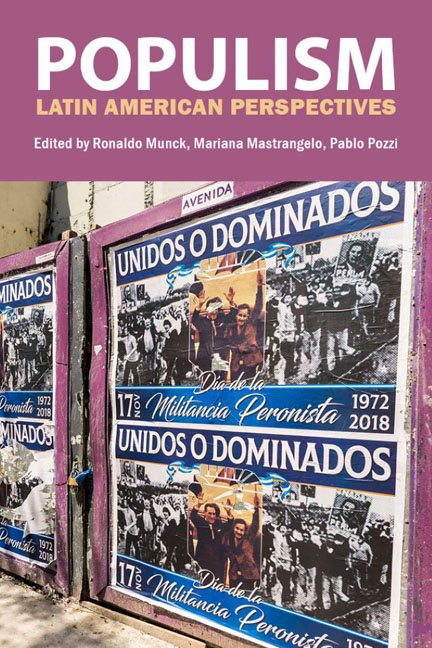Book contents
- Frontmatter
- Contents
- Abbreviations and acronyms
- Foreword
- Introduction
- 1 Populism in Latin America: development, democracy and social transformation
- 2 Peronism in Argentina: left or right?
- 3 The populist left in Chile: socialists and communists from 1936 to 1973
- 4 The left and the Workers’ Party in Brazil: a party between populism, social policies and the popular vote
- 5 Brazil, Bolsonaro and populism of the right
- 6 Political dilemmas of the government of López Obrador: between populism, democracy and the left in Mexico
- 7 The Bolivarian process in Venezuela: socialism, populism or neoliberalism?
- 8 Populist responses to crises of market democracy: the case of Bolivia’s Evo Morales
- 9 Ecuador: populism and the 2007– 17 political cycle
- 10 The Nicaraguan crisis and the mirage of left populism
- 11 Populism and the right in Latin America
- 12 Populism and the left in Latin America
- Afterword: a tale of two “people”: national popular and twenty-first-century Latin American populisms
- Contributors
- Index
7 - The Bolivarian process in Venezuela: socialism, populism or neoliberalism?
Published online by Cambridge University Press: 23 January 2024
- Frontmatter
- Contents
- Abbreviations and acronyms
- Foreword
- Introduction
- 1 Populism in Latin America: development, democracy and social transformation
- 2 Peronism in Argentina: left or right?
- 3 The populist left in Chile: socialists and communists from 1936 to 1973
- 4 The left and the Workers’ Party in Brazil: a party between populism, social policies and the popular vote
- 5 Brazil, Bolsonaro and populism of the right
- 6 Political dilemmas of the government of López Obrador: between populism, democracy and the left in Mexico
- 7 The Bolivarian process in Venezuela: socialism, populism or neoliberalism?
- 8 Populist responses to crises of market democracy: the case of Bolivia’s Evo Morales
- 9 Ecuador: populism and the 2007– 17 political cycle
- 10 The Nicaraguan crisis and the mirage of left populism
- 11 Populism and the right in Latin America
- 12 Populism and the left in Latin America
- Afterword: a tale of two “people”: national popular and twenty-first-century Latin American populisms
- Contributors
- Index
Summary
INTRODUCTION
Hugo Chávez won the presidential elections in December 1998 after a decade of neoliberal policies in Venezuela. The previous period had seen: two successive governments implementing neoliberal economic programmes; the spontaneous popular uprising of February– March 1989, which shook the two-party political system in place since 1958; two nationalist and leftist military uprisings; and a sitting president removed from office by parliament on charges of corruption.
The so-called “Bolivarian process”, that began in Venezuela with the electoral triumph of Hugo Chávez in 1998, was the popular response to the crisis of legitimacy of the political model of representative democracy that had been in place since 1958 (López Maya 1994: 32; Carvallo & López Maya 1989: 49). The failure of the productive model of import substitution, the foundation of representative democracy for 30 years, had become evident by the mid-1980s, with a profound economic crisis that worsened with the fall in oil prices in 1986.
The spontaneous popular uprising of 27– 28 February 1989, known as the “Caracazo” (Barrios-Ferrer 1990: 55; España 1989: 118), revealed the great discontent of the population with a political-economic system that did not satisfy their fundamental needs. The government's brutal repressive response caused hundreds of deaths in the neighbourhoods of Caracas and nearby cities. It reinforced the view that those who governed did not deserve to enjoy the popular support that had sustained the ruling two-party political model for three decades. The two parties in question were the Acción Democrática (AD [Democratic Action]) and Partido Socialcristiano (COPEI [Social Christian party]).
However, in the absence of alternative political options, and with a left in crisis, both in its electoral versions and in the groups that maintained the armed struggle, the two-party system would remain in power for another decade. But the decomposition of the political model continued, and in 1992 two military uprisings followed one after the other. They both failed but they showed that the ship of representative democracy was still sinking.
- Type
- Chapter
- Information
- PopulismLatin American Perspectives, pp. 121 - 138Publisher: Agenda PublishingPrint publication year: 2023



